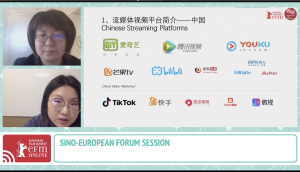How blockbusters and digital platforms are changing Hollywood’s relationship with China.
Elaine Chin is a producer with over 15 years’ experience in global content development and production. She just produced “The Dreaming Man” for Disney, inspired by their Touchstone title, “While You Were Sleeping,”starring Lin Yun (“The Mermaid”) and Chen Bolin (“Blue Gate Crossing”).
She was formerly vice president of production at Walt Disney Studios and launched their film initiative for the China market. She was also a film and television executive for 20th Century Fox and HBO, where she worked on award-winning films like Gus Van Sant’s “Elephant,” which won the Palme D’Or at 2003 Cannes Film Festival, and Sergei Bodrov’s “Mongol,” which was nominated for Best Foreign Language Film at the 2007 Academy Awards. She also ran the production company of director Justin Lin, who directed several films in the “Fast and Furious” franchise at Universal Pictures. Together, they cofounded Asian American pop culture blog “You Offend Me, You Offend My Family.” She graduated from Wellesley College in Massachusetts with a degree in art history and Chinese studies.
You started off as a literary agent assistant at William Morris Agency (now known as William Morris Endeavor). What made you get into entertainment production and development?
I was always passionate about entertainment, particularly film. Being Chinese and growing up in the Bay Area, I was influenced by my movie-going experiences, which ranged from mainstream Hollywood, to Chinese and Hong Kong cinema, to European arthouse. I saw the power of movies—their impact on how different cultures are perceived and influence perspectives. So with Hollywood being the dominant producer of entertainment for more than a century, it was obvious I needed to understand the business from that place and on the ground level.
I didn’t have any ties to the entertainment industry and started connecting with the few entertainment alumni from the Wellesley College network. It was clear that if I wanted to learn about the business first-hand, there would be no better way than to work in a major agency, so I ended up joining William Morris.
At that time William Morris and CAA were the two largest agencies which controlled and competed for the big star talent and projects. Assistants to agents had incredible access and exposure particularly in those days, when the business was much less corporate. Spec script sales were the norm and stars’ salaries were increasing exponentially. The film business was robust, with many projects developed and produced at the major studios. Meanwhile, independent films started to have mainstream success. There was an influx of talented filmmakers outside of the Hollywood system, like Justin Lin and Christopher Nolan, who cut their teeth working on a variety of studio movies—dramas, mid-sized action and thrillers—and eventually big-budget films.
Now, the business has changed. The film industry has contracted to produce largely blockbuster franchises and a handful of low-budget genre films. TV is growing but has been disrupted by digital players, and the market has become fragmented. The larger agencies are no longer autonomous and now have to work with their backers—hedge funds and investors—to manage their businesses. So, the focus has been directed towards other revenue streams, such as sports, branding, international sales and licensing, and investments in media/tech companies. As a result, talent development and representation is no longer the sole focus of the large agencies. This change has left a vacuum that has created opportunities for more specialized agencies, managers and producers.
You also cofounded “You Offend Me, You Offend My Family” (YOMYOMF) with director Justin Lin (“Better Luck Tomorrow,” “Fast & Furious”). What do you think is the importance of the digital sphere in entertainment, especially for Asian and Asian American creators?
The digital platforms have been an incredibly important entrée into the entertainment industry. How else would Brian Imanuel (a Chinese teenager from Indonesia) get worldwide attention for rapping on his iPhone? With so much media today, it’s hard for people outside the system to gain exposure, but with a distinctive voice, great timing and luck, it’s now possible to break through with platforms like YouTube and Vimeo. This has been important for talent who are outside the box, who don’t look like or sound like what has come before.
The challenge has been for these creators to take the next step and develop a sustainable career. Making a three-minute music video or comedy segment doesn’t mean that you can write a 30-60 minute show, or even recreate that three-minute episode week after week. This is not for lack of talent but rather focus and resources. Digital platforms demand audience engagement, so creators invest tremendous energy and resources marketing and connecting with fans leaving them less time to hone and develop their craft. For creators with the ambition to cross over into longer-form storytelling, this puts them at a disadvantage.
So the digital platforms serve as a new way for fresh voices to get noticed by the mainstream studios?
Yes, and right now we’re in a transition with many mainstream players throwing a lot of money and deals at talent. But, again, the investment of time and resources to actually develop new talent is more limited than ever. This is why it’s critical to identify producers, consultants and advisors to guide and inform emerging talent. If you’re a gifted baseball player, there is a whole system of coaches and training camps dedicated to your development and success. The internet is the Wild West—there’s no formal structure of mentoring or training. Even the most talented newcomer will have difficulty reaching lasting success, no matter how much potential they may have.
What do you think will be the future for these independent films and artists? Do you think there will be space for these people to gain notice?
It’s become an incredibly crowded marketplace. It’s much harder than it was in the beginning of YOMYOMF, and certainly further back when YouTube first started. It’s no longer just people making content and connecting with fans. Now, there are many more content creators who are well-versed in working and gaming the system—increasing views with click bait or provocative material, all to be the one who “breaks the internet.”
Going forward, it will be more challenging for outside individuals to break in. Even without changes to net neutrality, established streaming companies and major social media sites that have the scale, resources, and reach will drive the market, in terms of content creation and output. The money, appetite and interest for quality content will be even greater than before—the entertainment industry is always searching for the next new, exciting thing. With the speed of technology, the turnaround is even more relentless, so creators are vulnerable to getting lost in the noise, and will need the right support and development to have a career that can endure beyond their “15 minutes” of fame.
How do you think this movement away from smaller films is affecting Hollywood’s relationship with Chinese creators and studios?
With Hollywood turning towards bigger-budgeted, franchise-based IP that needs to play worldwide, and China developing primarily local content, there is a disjunction in how these two markets operate. Only a few years ago, many Chinese companies invested in U.S. content, and U.S. studios would cast Chinese actors in their global films, while investing in local-language films to gain access to the Chinese market. But this is no longer the case.
U.S. studios are refocusing on their core global tentpole business, although they still rely on the Chinese box office for revenue. Chinese companies are producing local films, though they would like global success. If we depend solely on U.S. studios, we will continue to see English-language tentpoles for predominantly Western audiences. And while the Chinese industry has made rapid strides, it is young and still struggling to create consistent, high-production-value commercial product—a process that Hollywood has perfected for more than a century. There are ways the two groups can help each other, but there is still a vast cultural and business divide.
There is opportunity for independently produced content to bridge that gap, but there are many regulatory and cultural challenges to working in China. Only a few years ago, the Chinese market experienced accelerated growth—local movies exploded, generating intense audience excitement. But as the market became flooded and audiences grew more sophisticated, the local box office became dominated by just a few big winners. There are enormous opportunities for collaboration between China and Hollywood, but over and over we see new investors and new producers make the same mistakes, because they didn’t follow the right advice or direction.
The Chinese box office is still on track to become the world’s largest box office. The market simply requires a new generation of producers and filmmakers to begin applying sound business principles, expert development skills, and hone production capabilities in the way that their counterparts have been able to develop in other countries. I’m confident it will happen. I’ve met and worked with many young Chinese producers and filmmakers who are bright, understand both China and the U.S., and are eager to learn. I expect great things from the Chinese industry going forward—it’s just a matter of time.
Do you think there will be a shift back to that, where U.S. studios start working more hand-in-hand with Chinese partners?
I think there will be a shift, but in a different way. It will become much more producer and project-oriented. It’s very difficult for large, diversified U.S. corporations to interface with Chinese organizations, given the very different ways that business is done. However, larger U.S. and Chinese companies are both risk-averse and heavily reliant on known-quantity IP to guide creative decisions. This is despite what the market has shown—that IP-based films and franchises are not a fool-proof strategy and cannot, alone, sustain an industry.
I do believe that because the market is so large, U.S. studios will return to China as it becomes even more dominant, and China will look to the U.S. for IP development and tech know-how. But this will happen more on a project basis through individual producers and funds, so I think there’s enormous opportunity at this moment for producers and creators who have the expertise and are willing to put in the time.
While it may seem a truism that making films and TV shows is an art and not a science, it’s all too easy to forget the art in our rush to apply newly acquired technical and financial resources. It’s only by investing in the artistic side of the process, by taking the time to develop stories and genuine creative originality, that the Chinese industry will develop the capability to produce content that captures worldwide attention.
–This article first appeared on Reach Further, East West Bank’s digital news magazine covering U.S.-China Business.










